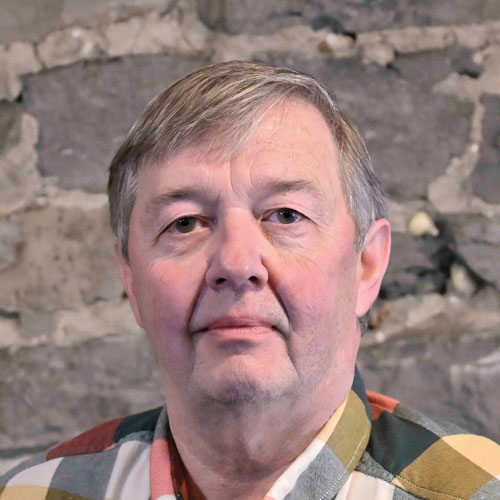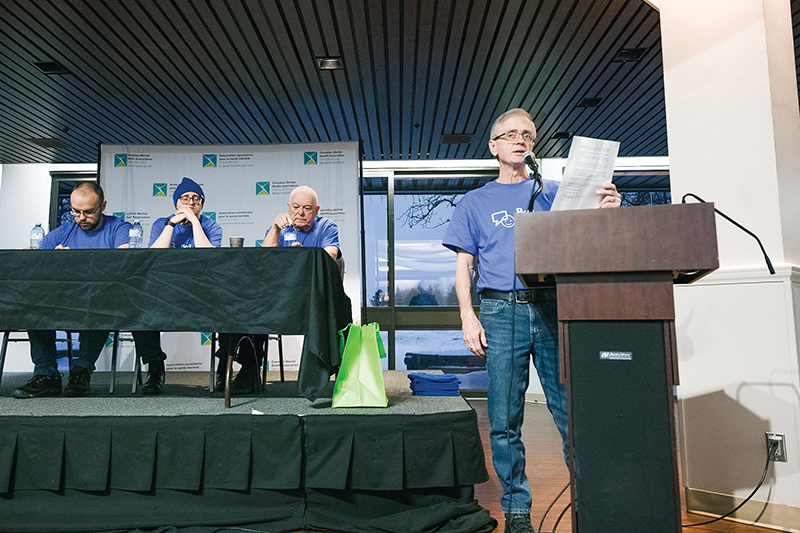Tony, a former Royal Canadian Navy dive engineer spoke of how dealing with PTSD is difficult when you have no idea what it is, and the symptoms it presents. His talk about recovering bodies from Swissair flight 111 which crashed off the cost of Nova Scotia in 1998 had the audience completely silent. Tinkess Photo
CORNWALL – Here is a statistic to make you stop and think for a moment: In Canada, we lose 4,000 people a year to suicide. That is more than ten times the number of people killed in motor vehicle collisions.
The number is staggering, but it was only one of many statistics provided by the Canadian Mental Health Association (CMHA) during a presentation at the Cornwall Civic Complex hosted by the Social Development Council of Cornwall and Area.
Carilyne Hebert, the executive director of the SDC explained that this session would be the first of a three-part program. “This is the first in a three-part series specific to mental health,” said Hebert. “So today we are joined with CMHA, who will also be delivering the part two and part three, which will be virtual.”
Chantal Tessier, the manager of mental health promotions with the CMHA spoke about the Bell Let’s Talk program, which tries to remove the stigma attached to mental health and promote conversation about the issues involved. (Bell Let’s Talk Day is January 24, and this is the fourteenth year for the program.) She then introduced Angele D’Alessio, a mental health promoter with CMHA, and who acted as the master of ceremonies of the event.
“We hope that the conversations and the series of conversations that we will have with you in the next few months will inspire you to plant the seed,” said D’Alessio. “We are obviously not going to change workplace culture here today. The idea is that you are inspired and particularly inspired by our panel of guest speakers, who will share with you their journey within their workplaces or barriers to employment, and what they would like to see changed for the better as we move this conversation along.”
Before turning the podium over to the four speakers, D’Alessio provided a few statistics regarding mental health. For example:
- One in three people will be affected by a mental health problem or illness. Prior to the pandemic the number was one in five.
- By age 40, fifty per cent of the population will have or will have had a mental illness.
- Major depression is the most common disorder, affecting one in ten people. Anxiety is second, affecting one in five people, but it comes in second because there are so many different diagnoses (social anxiety, obsessive compulsive disorder, post-traumatic stress disorder to name only three).
- There are currently about 200 diagnosable mental illnesses.
The cost, as you would expect, is incredible in many ways. According to D’Alessio, approximately 30 per cent of people are currently on either a short-term or long-term disability claim, and the cost to the Canadian economy is $50 billion annually. Recognizing and treating the problems would seem to be a foregone conclusion, yet there are still many people out there who suffer in silence. Events like this, and Bell Let’s Talk continue to promote bringing all the issues into the light and having conversations. Awareness in the workplace is one way to facilitate this.
The four guest speakers, identified by their first names, were then given the opportunity to tell their own very different stories. The first, Tony, spoke of dealing with post-traumatic stress disorder (PTSD), and how, when you don’t know what is happening to you, it becomes even more difficult to deal with.
Tony was a member of the Royal Canadian Navy for 21 years. In 1998 he was the chief engineer with the Canadian dive unit. He was one of the members of the navy tasked with recovering the bodies of the 229 people aboard Swissair 111, which crashed off the coast of Nova Scotia. Soon after entering the fuselage of the plane, he and his colleagues realized that not one body was intact. They were engaged with this task for several weeks.
Tony suffered from the effects of PTSD, but not knowing what the symptoms were, he did not understand what was happening to him. Only after confiding with a fellow service member who did understand, did he manage to get the help he needed. That help, and the knowledge he gained, helped him to deal with a second tragedy years later, when he lost his son to suicide, and he was the one who discovered him.
As Tony spoke, the room was completely silent, his story was so intense, and he received a standing ovation for his bravery in deciding to share it so that others might not suffer as he had.
The other three speakers, Tom, Mitchell, and Stephen had the opportunity to share their stories, each of which was different. On the surface, you might think that their problems might seem less severe that what Tony had suffered, but the thing you need to remember is that it is not the cause that should be evaluated, but the impact on the person suffering. Tom spoke of suffering from social anxiety disorder, which makes it very difficult for him to interact with other people in what many might consider to be inconsequential interactions.
Mitchell spoke of suffering from bipolar disorder, anxiety, and ADHD, while also dealing with the issues that a transgendered person might encounter. They spoke of how valuable it was to have a considerate and understanding employer and co-workers, and how little things that most people would not even worry about, like finding a non-gender specific washroom, can seem like the best thing that ever happened.
Stephen spoke as an advocate for mental health awareness, but also as a sufferer of depression and as a survivor of a suicide attempt. He spoke of how important it is to try and find a way to help someone who is suffering; to be aware of changes in behaviour which may indicate a problem.
“What we have to do in all our workplaces, and I don’t care where you work, what you do, is look around you,” said Stephen. “If you see somebody that’s been kicked in the head and are feeling down, give them a hand up. Don’t push them back down. We all need that little bit of a lift. I got my lift. I’m here. I have my picture on the wall out there. That’s how much it changed my life.
“I went out and I did something that I never thought I’d ever do. I’ve done thousands of things because somebody gave me a second chance. Let’s give other people a second chance is what we need to do.”
Several promotional items were handed out to attendees, but perhaps the most important one was a business card with the new toll-free, 24 hour a day, seven day a week 988 help number that can be called if suicide is being considered.
Help is available and the only cost is the time it takes for you to call. Take the time, make the call.

Terry Tinkess is a professional photographer, educator and journalist. He has been making a living with a camera and keyboard since 1999 and has been featured in such publications as The Ottawa Citizen, Cornwall Standard Freeholder, The Globe and Mail, The Miami Herald, Ottawa Construction News, The Ontario Construction Report, Ontario Home Builder Magazine, Reed Construction Data, Canadian Potato Business and most recently, The Record and Eastern Ontario AgriNews. Terry lives in Ingleside, Ontario with his wife Brenda, Mia the anxious Pittie and cats Wally and Chubbers.









